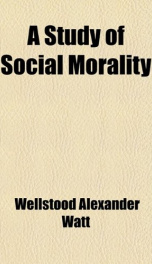a study of social morality

Purchase of this book includes free trial access to www.million-books.com where you can read more than a million books for free. This is an OCR edition with typos. Excerpt from book: sequences ruinous. The prejudices which seek to perpetuate duelling as the mark of some special virtues characteristic of a class, do not seem to he worthy of detailed consideration.1 In elucidation of the individual side of justice, on the other hand, to which we must next turn, we may notice, first, that the two virtues of justice and benevolence have often been compared as regards their emotional characteristics. It has been suggested that in strict justice the bloom is wanting which is seen in social virtue at its best; again, that benevolence is justice "touched with emotion";3 once more, that distributive justice (on one side) is a sort of universal - ised gratitude; all of which phrasesif we assume that the specific emotion of gratitude is dissipated with its being universalisedpoint to an emotionalintensity observable in benevolence, which is not found in justice. And this is largely true. Yet, in order to prevent the emotional element being turned into a snare for the benevolent, we must insist on the fact that by benevolence we mean a reasonable benevolence. Feeling becomes a dangerous ally if not kept in check. 1 The more interesting subjects of the "duel of law" and the "duel of chivalry" are admirably treated in Mr. Neilson's Trial by Combat. Trial by battle fueled before civilisation. But "even when the end came, so venerable an offspring of a deep-seated human instinct of strife could not wholly die. It left behind, to carry on the old barbaric lino, a bastard scion, the private duel" (Op. cil. p. 18). 2 A question parallel to that of whether the bloom in virtue in the form of temperance, courage, ete., is absent from the corresponding justice of Aristotle. See Stewart's " Notes " on the Xic. Etliics, bk. v. oh. v. § 17. Reference may also be made to the...
Info about the book
Author:
Series:
Unknown
ISBN:
0521273056
Rating:
3/5 (2)Your rating:
0/5
Languge:
English
Users who have this book
Users who want this book
What readers are saying
What do you think? Write your own comment on this book!
write a commentGenre
if you like a study of social morality try:
Other books by this author
Do you want to read a book that interests you? It’s EASY!
Create an account and send a request for reading to other users on the Webpage of the book!


